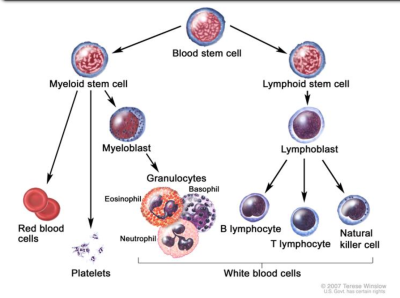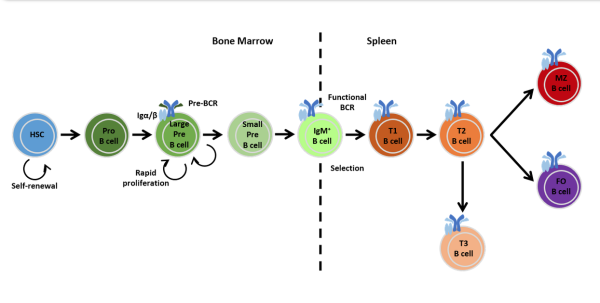B cell
 A type of white blood cell that makes antibodies. B cells are part of the immune system and develop from stem cells in the bone marrow. Also called B lymphocyte. 1)
A type of white blood cell that makes antibodies. B cells are part of the immune system and develop from stem cells in the bone marrow. Also called B lymphocyte. 1)
Blood cell development. A blood stem cell goes through several steps to become a red blood cell, platelet, or white blood cell. 2)
Immune System
Early B cell development and commitment to the B cell lineage occurs in the foetal liver prenatally, before continuing in the bone marrow throughout life.
B cells are at the centre of the adaptive humoral immune system and are responsible for mediating the production of antigen-specific immunoglobulin (Ig) directed against invasive pathogens (typically known as antibodies).

The function of B cells was discovered in the 1960s by Max Cooper who demonstrated that antibody production was completely abrogated in irradiated chickens after surgical removal of the Bursa of Fabricius (the primary site of B-cell development in birds) from which the notation ‘B’ cell was derived.
Several distinct B-cell subsets have been defined that possess distinct functions in both adaptive and innate humoral immune responses. 3)
SARS-CoV2 Antibody B Cells
Broad Institute - April 27, 2021 - By Sarah C.P. Williams A study of antibody-producing B cells from patients who recovered from COVID-19 reveals a new cross-reactive antibody and what makes some B cells more effective at neutralizing the virus.
Inside the body of a person with COVID-19, the immune system’s B cells are engaged in a full-scale battle with the SARS-CoV-2 virus. But some B cells are better at this than others. Now, scientists from the Broad Institute of MIT and Harvard, Massachusetts General Hospital, California Institute of Technology, Brigham and Women’s Hospital, and other institutions have for the first time described key characteristics of B cells that are effective at neutralizing, or inactivating, the SARS-CoV-2 virus and related coronaviruses.
The team studied blood samples from 14 people who recovered from COVID-19, and revealed distinct patterns of gene expression in B cells that produce antibodies that bind tightly to and neutralize SARS-CoV-2. They also discovered a new antibody, BG10-19, which neutralizes the virus, variants of concern such as ones first identified in the UK and South Africa, and the coronavirus that caused the 2003 SARS outbreak.
The findings, published today in Cell, could help scientists better understand why some people don’t respond as well to existing COVID-19 vaccines or therapies, a first step toward improving vaccines and treatments. 4)
